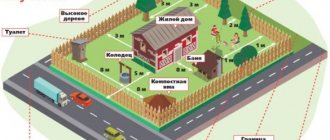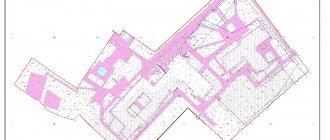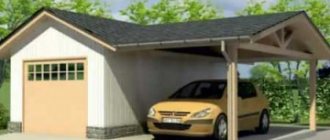What is a dacha amnesty?
The dacha amnesty began in 2006 with the “Law on Dacha Amnesty No. 93-FZ”.
Now this is already a whole SYSTEM of laws, which together describe a simple procedure for registering rights to land plots that were provided to you earlier, but there were no clear documents for the land. Unfortunately, there is no separate large document that includes ALL the conditions of the “dacha amnesty” so that you can conveniently view it after each revision.
The list of all conditions for the dacha amnesty is described in a WHOLE NUMBER of federal laws. The entire “dacha amnesty” is, as it were, “spread out” across various legislative acts of the Russian Federation. To view it in its entirety, information has to be collected bit by bit in different codes and other legislative acts.
And yet, this entire large system of laws, referred to as the “dacha amnesty,” covers almost all land plots with the goal of legalizing taxable objects for the state as much as possible.
Sometimes laws are passed that simplify registration of rights, but not registration. These are different concepts. Registration of rights is the collection, receipt and creation of Decrees, drawings, technical passports, plans and other documents (for example, declarations) stating that you once had the right to land or a garage. This is a process that takes time and effort; it is not just a trip to the MFC to register an existing right. Registration of rights is the actions of Rosreestr to accept the title documents that you bring to them, which already prove that you already have the right to the land (or to the building). For example, you brought to Rosreestr a certificate of lifelong inheritable ownership of a land plot for re-registration of ownership .
For example, from February 2021, notaries, when issuing a “Certificate of Inheritance by Law” and in real estate transactions, no later than the end of the working day, electronically submit your application for state registration of rights and the documents attached to it to Rosreestr. And in the near future, notarized transactions will be registered in the Unified State Register of Real Estate almost in real time. These innovations concern simplified registration of transactions, but not registration of rights to real estate .
Why so much “noise”?
Over the past 2 years, there has been a lot of indignation throughout the country regarding the introduction of new, completely far-fetched taxes. Where did these rumors come from? Simply put, who “caused” such panic among summer residents and gardeners?
The answer is simple: most likely, they themselves. As they say, “we hear the ringing, but we don’t know where it is.”
The fact is that a lot of discontent and discussions on this topic began precisely after the extension of the “dacha amnesty”. Many owners of dachas and vegetable gardens misinterpreted the essence and believed that they would have to register all outbuildings within the established time frame.
Competent experts explain: in general, the amnesty applies only to individual residential buildings and personal subsidiary plots
. And within the framework of this program, citizens have the right to register ownership of their land plot and residential building (house) in a fairly short time. The emphasis is placed specifically on residential buildings. That is, a barn or a country toilet has nothing to do with this concept.
Alexandra Tsvetkova, vice-president of the Moscow Bar Association, comments: “Currently, the obligation to register such dacha buildings as a garage, greenhouse, summer kitchen is not fixed.”
.
Today, lawyers say: the main thing is to register a residential building and land. But as for outbuildings, it is, of course, possible to include them in the register, but this is not a mandatory action.
What changes have occurred in the “dacha amnesty” in 2021?
This new law No. 404-FZ introduced changes to the law that describe only part of the “dacha amnesty”. In our case, Law No. 404-FZ of December 8, 2020. made changes only to the Federal Law of July 13, 2015. No. 218-FZ, namely in part 12 of article 70. And now this part reads like this:
"12. Until March 1, 2026, it is allowed to carry out state cadastral registration and (or) state registration of rights to a residential or garden house created on a land plot intended for gardening by citizens, for individual housing construction or for running personal subsidiary plots (only those private plots that located within the boundaries of the settlement), and corresponding to the parameters of the individual housing construction object specified in paragraph 39 of Article 1 of the Town Planning Code of the Russian Federation, based only on the technical plan (it is prepared by a cadastral engineer) and the title document for the land plot, if in the Unified State Register of Real Estate the applicant's right to the land plot on which the specified property is located is not registered.
In this case, information about the relevant property, with the exception of information about its area and location on the land plot, is indicated in the technical plan on the basis of project documentation (if any) or a declaration specified in Part 11 of Article 24 of this Federal Law.
In this case, the presence of a notice of the planned construction or reconstruction of an individual housing construction project or a garden house, a notification of the completion of construction or reconstruction of an individual housing construction project or a garden house is not required .
State cadastral registration and (or) state registration of rights to a residential or garden house in the case established by this part are carried out regardless of compliance with the requirements established by Part 2 of Article 23 of the Federal Law of July 29, 2021 N 217-FZ “On Gardening by Citizens” and gardening for one’s own needs and on amendments to certain legislative acts of the Russian Federation."
The original of all the conditions in Article 70 of Law No. 218-FZ, to which these changes were made, can be viewed in the official source - “ConsultantPlus” by inserting this link into the search bar of your browser: https://www.consultant.ru/ document/cons_doc_LAW_182661.
What do these changes mean in the “dacha amnesty” in 2021?
This means that if you have a title document for a plot of land with some kind of VRI: “for gardening by citizens”, “for private housing construction” or “for running personal subsidiary plots” (but only that private plot of land plots that is located within the boundaries of a populated area ), then you can put on the cadastral register any building that you have on this site only according to the technical plan based on the design documentation (if any) or declaration .
The most important thing here is that this building must comply with the parameters of an individual housing construction project specified in paragraph 39 of Article 1 of the Town Planning Code of the Russian Federation. The introduction of a simplified procedure for state cadastral registration and (or) state registration of rights in relation to individual housing construction and garden houses does not at all exclude the obligation with urban planning and construction standards when constructing buildings and structures on a land plot, as well as carrying out their reconstruction or demolition and rules , technical regulations, as well as requirements for the intended purpose of a land plot (clause 1 of Article 263 of the Civil Code of the Russian Federation, part 6 of Article 52 of the Civil Code of the Russian Federation).
This also means that if you started construction on a dacha (garden) plot of land provided to you before August 4, 2021 , BUT did not receive a construction permit, then you have the right to send a notice of construction to the authorized body, and at the same time receive a construction permit and permission to enter an object is NOT NEEDED. If this provision is not extended after 2026, then you will have to prove your rights in court.
Thus, by changing Article 70, the list of real estate objects that can be registered as property in a simplified manner has been further EXPANDED. But this article 70 is NOT THE WHOLE “dacha amnesty.” All mechanisms of the “dacha amnesty” apply to individual residential houses and garden houses built both on garden plots (and they are mainly outside the boundaries of the populated area) and on plots for individual housing construction (and they are located within the boundaries of the populated area) and for running personal subsidiary plots (which happen both within the boundaries of populated areas and outside it - on agricultural lands).
To exclude the occurrence of legal consequences associated with the recognition of an object as an unauthorized construction, we recommend that you familiarize yourself in advance with the land use and development rules of the city (the so-called PZZ), within the boundaries of which your land plot on which you plan to build is located.
Receiving an address
As soon as the house is officially registered, it must receive its own number; the municipality deals with this issue. To get an address for your home, you need to perform a number of steps:
- write the application by hand;
- provide a document confirming the right to use the site;
- attach a document that confirms the right to own a house located on the same plot.
After submitting all the documents, the owner waits a month, after which the house is assigned a number. After this, according to the law, a cadastral passport must be issued. Once all these steps are completed, you can register for housing in accordance with the law.
What areas and buildings can be registered under the dacha amnesty?
The “dacha amnesty” has always concerned NOT only dacha or garden plots, it applies to ALL plots that were once provided by the state on any right, but not property, but there are still no correct documents for the land, or they have not been formalized before end properly.
So, under the dacha amnesty, you can quickly and legally register what has already been provided, but there are no documents for the property:
- 1. Land for individual development, small buildings, such as a bathhouse, garage, etc.;
- 2. Dachas located in gardening partnerships and cooperatives;
- 3. Land granted for lifelong (inheritable) ownership or for indefinite use (in fact, it was a lease).
- 4. An individual residential building or garden house must comply with the parameters defined by the Town Planning Code of the Russian Federation (in particular, the number of above-ground floors is no more than three, height is no more than 20 meters).
- 5. Garages, both in cooperatives and detached.
Unfortunately, you will not be able to register ownership of property located in protected areas, park areas, territories owned by military departments, or places where objects of cultural value are located.
For example, how to register a country house under the country amnesty?
To register a garden house on a dacha plot under the dacha amnesty, you must collect and submit the following documents to Rosreestr:
- 1. Fill out a declaration for a garden house (the form can be downloaded on the Rosreestr website);
- 2. Invite a cadastral engineer to your site, he will make the necessary measurements of all objects subject to registration, draw up a technical plan , and write the data to disk;
- 3. You (as the owner of a summer cottage) go with this disk to the nearest MFC;
- 4. If the right to the land plot has not yet been registered with Rosreestr, then it will be necessary to submit the title documents for the land. This could be: an extract from the household register, a resolution from the district administration to allocate land to you, or a certificate of ownership, or (for example) an old sales contract, once registered with the BTI.
What is the essence of the “garage amnesty”?
Another aspect of the “garage amnesty” will begin to operate on September 1, 2021; it is from this date that the changes set out in Federal Law No. 79-FZ of April 5, 2021 “On Amendments to Certain Legislative Acts of the Russian Federation” come into force. .
Until September 1, 2026, you can register ownership of the land under the garage if:
- 1. You have a garage that was built BEFORE December 29, 2004 (the day the Town Planning Code of the Russian Federation came into force);
- 2. If this garage is: a separate capital construction project or in a cooperative - blocked with common walls with other garages in the same row, sharing a roof, foundation and communications with them;
- 3. If a land plot for placing a garage was provided to a citizen or transferred to him by any organization (including with which this citizen had an employment or other relationship) or was otherwise allocated to him or the right to use such a land plot arose in the citizen for other reasons reasons;
- 4. If a land plot is formed from a land plot provided or otherwise allocated to a garage cooperative or another organization under which a garage cooperative was organized for the placement of garages, or the right to use such a land plot arose with such a cooperative or organization on other grounds and the garage and (or) the land plot on which it is located is distributed to the relevant citizen on the basis of a decision of the general meeting of members of the garage cooperative or another document establishing such distribution.
If you do not have a document confirming the provision or other allocation of a land plot to you or the emergence of your right to use such a land plot for other reasons, the following documents can be attached to the application:
- 1. An agreement on connecting (technological connection) of the garage to engineering and technical support networks, and (or) an agreement on the provision of utilities in connection with the use of the garage, concluded BEFORE the date entry into force of the Town Planning Code of the Russian Federation (that is, BEFORE December 29, 2004) , and (or) documents confirming the citizen’s fulfillment of obligations to pay for utilities;
- 2. A document confirming the conduct of state technical registration and (or) technical inventory of the garage before January 1, 2013 in accordance with the requirements of the law in force at the time of such registration and (or) inventory, which contains indications of the applicant as the owner of the garage or customer production of the specified document and for the year of its construction, indicating the construction of the garage before the date of entry into force of the Town Planning Code of the Russian Federation.
If your garage is located on the territory of a garage cooperative (even if you have ceased membership in the cooperative, including as a result of its liquidation or exclusion from the unified state register of legal entities in connection with the termination of the legal entity), then the application for preliminary approval the provision of a land plot or the provision of a land plot are attached:
- 1. A document confirming the provision or other allocation of the land plot from which the requested land plot is formed or should be formed, to a garage cooperative or other organization under which the garage cooperative was organized, for garage construction and (or) placement of garages, or a document confirming acquisition by the specified cooperative or organization of the right to use such land plot on other grounds;
- 2. The decision of the general meeting of members of the garage cooperative on the distribution of a garage and (or) the specified land plot to a citizen or another document establishing such distribution, and (or) a document issued by the garage cooperative confirming the payment by such a citizen of a share (share contribution), including without indicating that the payment of such share (share contribution) is full, and (or) confirming the fact of the construction of a garage by this cooperative or the specified citizen;
- 3. The layout of the land plot on the cadastral plan of the territory (hereinafter referred to as the layout of the land plot) in the event that the requested land plot is to be formed and there is no project for surveying the territory within the boundaries of which such a land plot is to be formed.
- 4. An extract from the unified state register of legal entities about the garage cooperative, of which the applicant is a member.
The application for the provision of land on which the garage is located is also accompanied by a technical plan for this garage. This is stated in paragraph 8 of Article 6 of the Federal Law, which “opens” this aspect of the “Garage Amnesty” from September 1, 2021.
It will not be possible to register a territory fenced at one’s own request without any legal grounds. And now it is no longer possible to continue evading taxes. In the article “Benefits for summer residents on payments for land” you can find out what benefits on land tax for a summer house you can count on in 2021.
Why does the state need a dacha amnesty?
The state decided to speed up the legal registration of “gray” dacha buildings by simply tightening the tax punishment of citizens. If you do not register the house you have built, you will face a fine of +20% on the tax.
Don’t want to pay increased property taxes and still haven’t registered your country house? Then get ready for huge problems:
- Now you need to collect a complete package of documents, and in a year or two, most likely, you will have to register the building through the court (and without registration you will not be able to sell the property, rent it out, or inherit it).
- Bills are being considered under which it will not be possible to register a squatter building at all; it will simply be demolished.
- Amendments are being considered according to which the land tax on plots for individual housing construction, if according to the documents the land is empty, will be increased several times, so there will be no way to save money.
And this does not take into account the considerable penalties for tax evasion, including criminal liability.
Advantages of dacha amnesty for citizens
Of course, there are many more advantages from the dacha amnesty and they are much more significant than the disadvantages, since with correctly and TIMELY executed land documents, risks for the owner in the future are reduced or completely eliminated, and there are undeniable guarantees of the protection of their rights in any possible conflicts.
- A country house (or residential) to which ownership has been registered is much more expensive than the same house, but to which no one has rights.
- It is more profitable to pay land tax (which is only 0.3% of the cadastral value) than high rent if you remain a tenant;
- Quick legal status of objects built on the site;
- In this regard, it will be possible to dispose of real estate at your own discretion, to make various transactions, since only the OWNER according to the documents can sell, donate or bequeath land or a house;
- At a registered dacha, registration in a registered house will be possible;
- Summer residents will have the opportunity to individually conclude contracts for the supply of energy resources;
- You will be able to insure a “legalized” home. Otherwise, if a house to which there are no rights yet suddenly burns down, there will be no compensation;
- A minimum package of documents that reduces paperwork;
- When applying for a dacha amnesty, you will save significant time and money.
Don't wait until the end of the year, time flies very quickly. Perhaps next year the “dacha amnesty” will be turned into a list of punitive measures. Sign up for a consultation with a professional land lawyer, we will tell you what can be done quickly and efficiently with the documents for your land plot.
If you have any questions: which area is covered by the “dacha amnesty”, ask our lawyer online for FREE: what documents in your case are needed to register land or a house under the dacha amnesty.
Share this article:
WHY REGISTER REAL ESTATE
1. An unregistered house cannot be sold, donated, or inherited. It does not exist legally, and if not the owner, then his children and grandchildren will have to deal with the registration of real estate;
2. If the house does not legally exist, then it is impossible to connect communications to it: gas, water. To carry out amenities, a certificate from the Unified State Register is required;
3. One of the biggest advantages of decorating a garden house is the ability to convert it into housing and register in it.
And to recognize a garden house as residential, it must meet certain criteria, including the presence of a stationary heating system, lighting, water supply, sewerage, etc.








